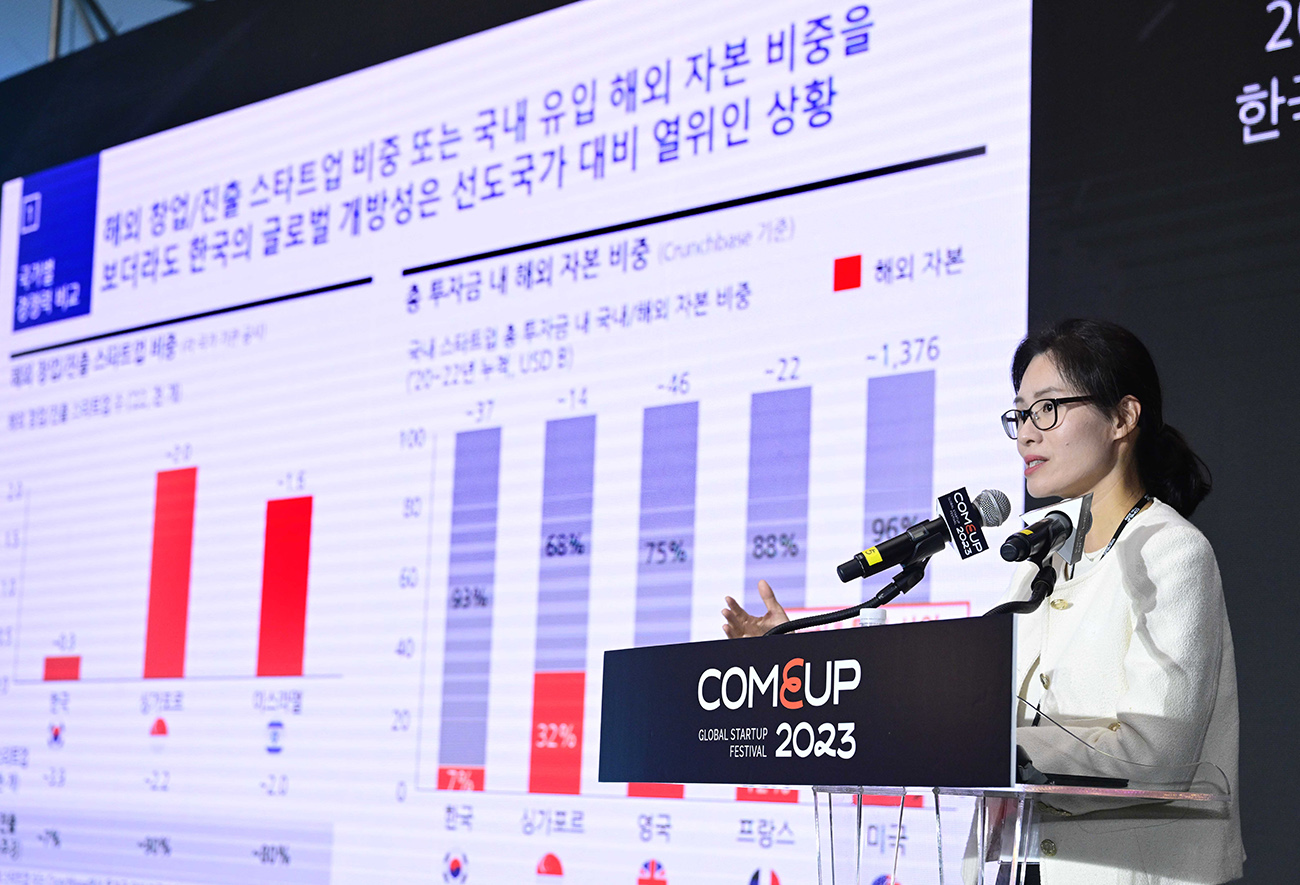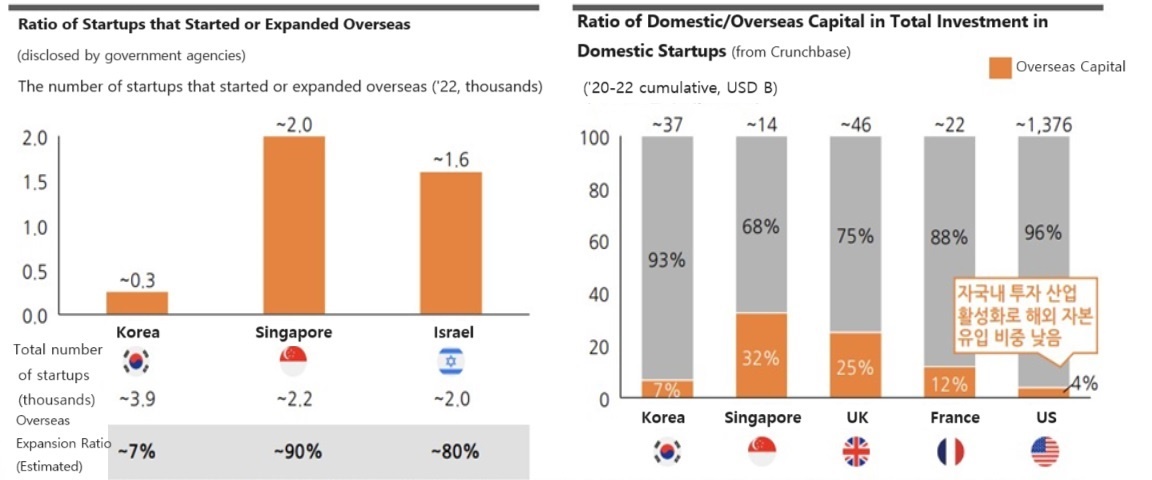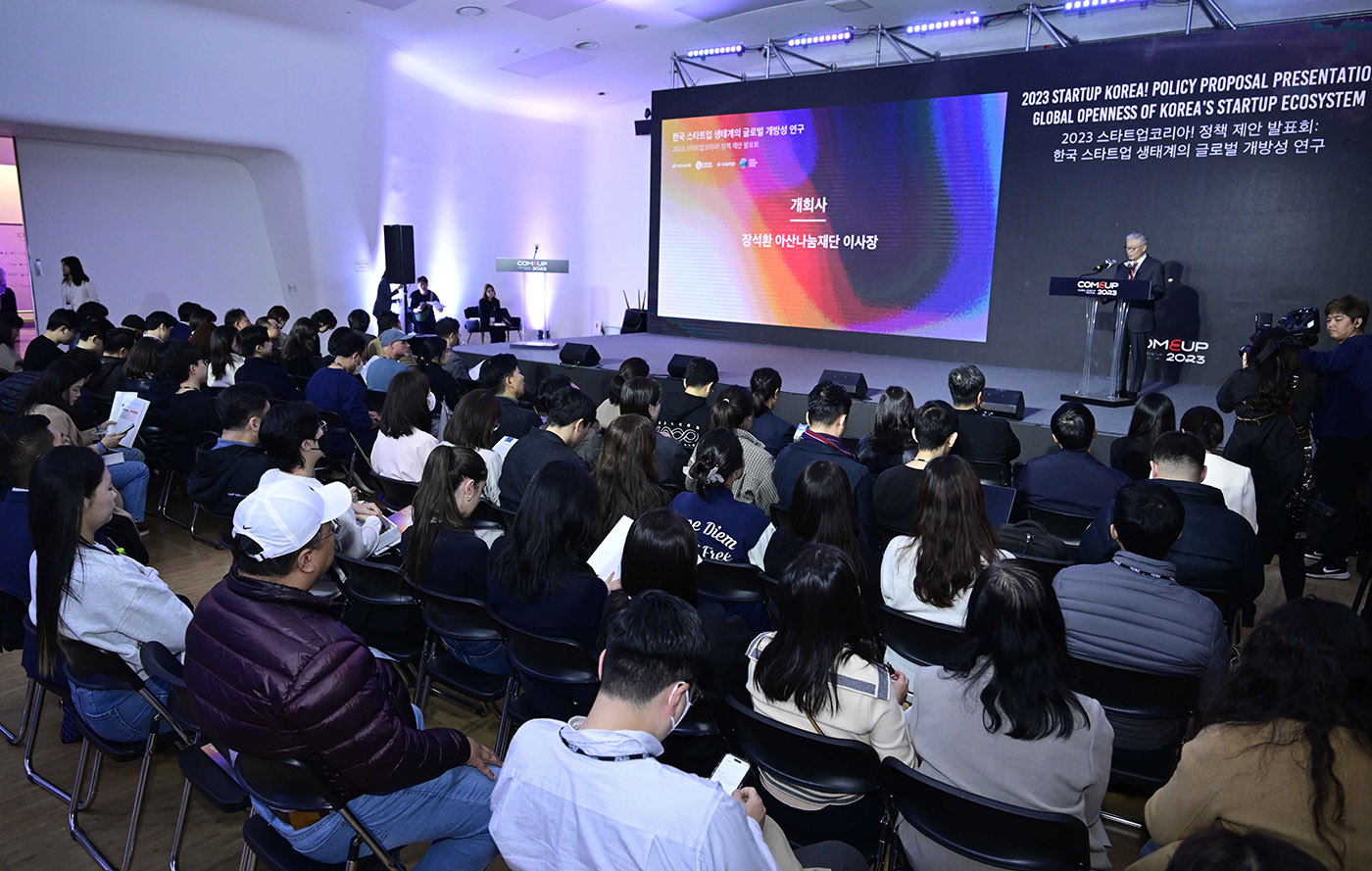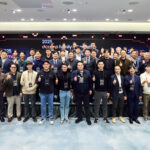
Representative startup support organisations in Korea held a policy proposal presentation during the startup festival ‘COMEUP 2023(컴업 2023)’ on the 9th.
On this day, Asan Nanum Foundation, Startup Alliance, Banks Foundation for Young Entrepreneurs D.CAMP and Korea Startup Forum released the “2023 STARTUP KOREA!” report, a study on the global openness of the Korean startup ecosystem, and held a policy proposal presentation. The event consisted of a presentation of the report by Hyoju Seo, Partner at Bain & Company, followed by a panel discussion.

The report presentation examined Korea’s competitiveness in terms of global openness (connectivity), which refers to the degree of ease of movement of startups, capital and talent both inbound and outbound between Korea and global countries. According to Startup Genome’s 2023 Global Startup Ecosystem, cited in the report, South Korea lags behind leading countries such as the US, UK, Israel and Singapore in terms of global openness. As of 2022, the number of startups founded overseas by South Korean entrepreneurs or expanding overseas from South Korea was about 300, compared to about 2,000 in Singapore and 1,600 in Israel. In addition, as a percentage of the total number of startups in the ecosystem, Korea’s overseas expansion rate is about 7%, compared to about 90% in Singapore and 80% in Israel, a significant difference from the leading countries.

In response, the “2023 STARTUP KOREA!” report suggests three main policy directions for the Korean startup ecosystem to develop and secure a global leadership position: simplifying procedures and regulations, improving the composition and quality of support programmes, and raising awareness and improving infrastructure.
First, the report emphasises that inefficient and unclear procedures and regulations for incorporation, startup visas and work visas should be simplified. For foreigners setting up domestic start-ups, guidelines for minimum capital and other requirements should be clearly established, and the online incorporation system available only to Koreans should be extended to foreigners to further streamline the process. It was also suggested that the high issuance requirements for “start-up visas” and “work visas” should be eased and restrictions improved.
The report also provides policy guidance on barriers and constraints to foreign capital inflows, foreign investment and overseas expansion. In order to remove administrative and procedural constraints on domestic and foreign investment, it urges that the requirement for foreign venture capital firms to obtain a domestic licence should be considered in the long term, but that a system should be put in place to ensure that adverse effects can be ignored by strengthening management supervision. It also states that consideration should be given to establishing a parent fund account focused on overseas investment to facilitate domestic venture capital firms to go overseas, phasing out and abolishing the investment limit for start-up investment company licences, and amending the law to allow start-up investment companies to establish overseas branches. Finally, it is proposed to extend to entrepreneurs the capital gains tax exemption for flips involving the relocation of headquarters overseas, but to review the tax deferral period and clarify the scope and conditions of the tax exemption for investors.
Second, it is suggested that the government and the private sector should expand their cooperation to organise and improve the quality of programmes to provide practical support to domestic and foreign start-ups. In particular, support programmes for foreign startups should be transformed into forms that strengthen institutional effectiveness, such as long-term operation, close educational mentoring, and mandatory entry into the domestic economy, while startup incubation programmes for foreign startups should strive to improve their overall quality by increasing the effectiveness of their structure and operation, strengthening programme review and educational expertise, and expanding funding.
Finally, the report concludes that awareness-raising efforts and infrastructure improvements are needed to ensure that the expansion of global openness is seamlessly integrated into the Korean startup ecosystem. In terms of global openness, the report states that “we need to build consensus among the general public and public and private organisations, and in terms of infrastructure, we need to strengthen the ‘foreign language service’ on relevant websites to overcome language barriers”. In addition, it suggests that large-scale campuses and events organised by the private sector and communities for foreigners should be actively established to create a networking space where different actors in the ecosystem, such as entrepreneurs, investment companies and developers, can share information and ideas and make connections.

Suk-Whan Chang, Chairman of Asan Nanum Foundation, said, “Asan Nanum Foundation initiated this STARTUP KOREA! study with Bain & Company because we agree that issues related to global openness need to be improved in order for the Korean startup ecosystem to lead the global market. “We hope that the global openness findings and policy insights of STARTUP KOREA! will be widely shared, and that the various recommendations will be reflected in future policies to improve the global openness of startups and lead to macro benefits for the country, especially as it would be released during COMEUP 2023, the largest startup event in Korea.”
The panel discussion was moderated by Sungjin Choi, CEO of Korea Startup Forum, with Jiho Kang, Partner, Antler Korea, Seeun Kim, CEO of TICTAG KOREA, Youngduk Kim, CEO of Banks Foundation for Young Entrepreneurs D.CAMP, and Jinwook Jung, CEO of Seerslab, discussing the global openness of the Korean startup ecosystem.
“To increase the global competitiveness of the domestic startup ecosystem, we need to create an environment where startups from around the world can freely do business and communicate across borders,” said Dohyeon Kim, Chairman of Startup Alliance. “We hope that the infrastructure for global openness will be in place in the near future.”
Youngduk Kim, CEO of Banks Foundation for Young Entrepreneurs D.CAMP, said, “I think this report does a good job of presenting concrete action plans on what we need to consider and move forward with in terms of global openness.” “Korea’s startup culture needs to expand its diversity and actively engage in external exchanges and openness to create startups that are not bound by national borders to create growth and prosperity in our country.”
Sungjin Choi, CEO of Korea Startup Forum, said, “As the startup ecosystem becomes more globally connected, openness is becoming a measure of global competitiveness, and we hope the government will take advantage of this policy proposal to improve the system and awareness.”







Leave a Comment